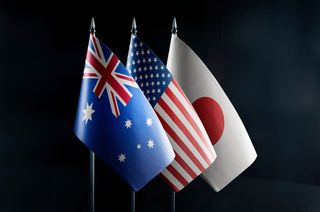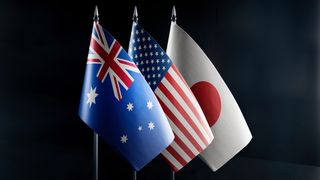Key findings
1. Negative views of Beijing persist across all three countries, but fewer Australians see war with China as likely
- Fewer Australians see conflict with China as likely; less than half of Australians say war with China is somewhat or very likely, down from 59 per cent in 2022.
- Twice as many Japanese respondents (40 per cent) than Americans (19 per cent) say war with China is very unlikely for their country in the next 10 years.
- A majority of respondents believe that Chinese dominance in Asia would be bad for their countries. More than two-thirds (67 per cent) of Japanese respondents say that China being the most influential country in Asia would be bad for their country, followed by 57 per cent of Australians and 51 per cent of Americans.
- All three countries show a clear perception that China, not the United States, will be the most economically and militarily influential country in Asia. Yet, US allies remain noticeably more optimistic about US influence in Asia than Americans themselves.
2. While US alliances remain important to all three publics, American and Australian publics are slightly less positive about them than last year
- A majority of Australian (54 per cent) and Japanese (55 per cent) respondents continue to believe their US alliance makes them safer, albeit fewer Australians than last year (63 per cent).
- Half or more of Americans think US alliances with Australia (53 per cent), Japan (52 per cent), and NATO (54 per cent) make the United States more secure — slightly fewer than in 2022, but still well above 2021 levels.
- Japanese respondents (55 per cent) are nearly twice as positive about the helpfulness of the United States in Asia than Australians (29 per cent), outpacing even Americans’ self-perception (39 per cent). However, scepticism about the US role in Asia is more pronounced among 18–34 year old Americans and Australians.
- A plurality of Australian (36 per cent) and Japanese respondents (35 per cent) support US handling of China, though Americans (20 per cent) are less positive about their own country’s handling of China.
3. Australian, American and Japanese publics continue to favour robust responses to Chinese aggression
- Half of Australians support following the United States into armed conflict if a US ally like Japan is attacked — more than twice the percentage of Japanese respondents (24 per cent) who say they agree with following the United States into conflict if a US ally like Australia is attacked.
- While Australian (46 per cent) and American (35 per cent) respondents express more willingness than not when it comes to sending military forces in the event of a crisis in Taiwan, Japanese respondents (26 per cent) appear less eager.
- Australians and Japanese respondents see a different role for the United States in their security. Australian respondents (46 per cent) are twice as likely as Japanese respondents (19 per cent) to support basing US marines in their own state, and are more receptive to an independent foreign policy (60 per cent of Australians agree versus 36 per cent of Japanese).
- Minorities in all three countries agree with introducing additional taxes to make their countries’ militaries more competitive with China’s military — 36 per cent of Australians, 37 per cent of Americans and just 24 per cent of Japanese respondents.
- While strong majorities in all countries want to collaborate on non-traditional security issues, Australians (84 per cent) are keener than Japanese respondents (63 per cent) to hold China to account on human rights.
4. AUKUS is broadly supported by all three publics, particularly in Australia — even if Australians believe it will lock them into supporting the United States in a conflict
- All three publics think the AUKUS partnership makes Asia safer. For Australians, a plurality of 43 per cent think it makes the region safer.
- While a third or more of American (32 per cent) and Japanese respondents (38 per cent) say they don’t know whether AUKUS makes Asia safer, over five times as many Americans and Japanese respondents agree that it makes Asia safer than those that disagree.
- Only small minorities (14–19 per cent) in all three nations think it is a bad idea for Australia to have nuclear-powered submarines.
- Some 60 per cent of Australians see AUKUS as a good idea that will create jobs.
- Despite such support, nearly half of Australians think AUKUS will lock Australia into supporting the United States in a conflict, with just 10 per cent disagreeing.
5. Despite a year of turmoil in Washington, views of US political dysfunction remain largely unchanged while the impact of the US 2024 election on Asian alliances may be less significant than anticipated
- Americans and, to a lesser extent, their allies remain very concerned about the state of US politics, but no more notably concerned than before the 2022 midterm elections.
- Australians hold more negative opinions (45 per cent) on a second Trump term than Japanese
respondents (40 per cent), but both publics are increasingly unbothered by a second term for either leading candidate. - Japanese publics believe their alliances with the United States should continue irrespective of who wins office in 2024, while Australians are more divided on the question though still more likely to want to maintain their alliance regardless of the 2024 outcome.
Introduction
In August 2023, the United States Studies Centre conducted a public opinion survey in Australia, the United States and Japan to understand the public sentiment in each nation on a variety of issues one year out from the 2024 US presidential election.
Since the previous iteration of polling by the United States Studies Centre (USSC) in October 2022, uncertainty about Beijing’s intentions continued with growing tensions over Taiwan; Australia’s Defence Strategic Review delivered a bleak assessment of the nation’s military preparedness and shortened warning time before a major conflict; Australia and Japan committed to the greatest levels of investment in their respective defences since the Second World War; the US Congress increased its focus on the region with the formation of a new select committee on China; and the business community quietly embraced “de-risking” in the face of new export control rules by Washington and increased political pressure on investors within China. The level of unease was only exacerbated by US political discord, with the 2022 US midterm elections delivering one of the tightest-ever House majorities by the Republican Party; the historic first-ever ousting of a US House Speaker; a criminal mugshot from a former president; two near encounters with congressional fiscal cliffs; and highly politicised investigations into the two leading candidates for the presidential election next year.
USSC polling in 2023 reveals continued support for the alliance agenda.
With just over a year remaining before the 2024 US presidential election, one might expect from these trends a deepening public pessimism about US alliances in Australia and Japan. Yet, USSC polling in 2023 reveals a strikingly positive picture about the future for cooperation and partnership between the United States and its allies.
While Australian, American and Japanese respondents see China as both harmful to Asia as well as the region’s future economic and military leader, they are not expecting a war. Indeed, compared to 2022, fewer Australians see war with China as a likely outcome. Undoubtedly contributing to that confidence in peace is the fact that majorities in all three countries continue to say their alliances make them safer. But the three publics also make clear that they do not want these alliances to stand idly, with large majorities signalling a strong appetite for closer cooperation across a range of security initiatives from the AUKUS partnership to supporting Taiwan in a contingency and assisting democratic elections in Asia.
Perhaps most surprisingly in the aftermath of continued US political dramas, Australian and Japanese concerns about American democracy, the ability of congress and the president to do their jobs and political violence remain largely unchanged, and are even slightly decreased from 2022. Furthermore, just one year away from the presidential election, both Australians and Japanese respondents remain supportive of their alliances with the United States even if their preferred 2024 candidate is unsuccessful and a more unpopular president reclaims the Oval Office. US politics may be cacophonous, but it does not appear to be a deal breaker for US allies in Asia.
This report ultimately finds that public support and ambition for cooperation between Canberra, Washington and Tokyo is strong. The question is whether it is strong enough to weather the challenges ahead.
Methodology
Unless indicated otherwise, the polling data used in this report was derived from surveys conducted between 15 and 25 August 2023. These surveys were conducted by YouGov, a global public opinion and survey company, which fielded representative samples drawn from Australia, the United States and Japan. The surveys were administered online to adult, citizen populations with sample sizes of 1,019 in Australia, 1,055 in the United States and 1,015 in Japan. These surveys build on previous USSC surveys of representative US and Australian samples in September 2022, December 2021, February 2021, October 2020 and July 2019 and collaborative polling projects with the Asian Research Network in March 2017. Question wording was kept as consistent as possible to permit valid inferences about trends and changes over time.
The maximum margin of error is approximately 3.1 per cent for the entire sample of respondents in each country. This is the 95 per cent confidence interval for a 50 per cent proportion. It is larger for the subsets of population (for instance, by vote and age). Figures 2, 11, 13, 17, 22, 23, 24 and 25 in this report polled a 50 per cent sample for each population.
Finding 1: Negative views of Beijing persist across all three countries, but fewer Australians see war with China as likely
The year 2023 may prove to be a watershed moment for Australian defence and foreign policy strategy. In March, Australia joined the United States and the United Kingdom in announcing the AUKUS Optimal Pathway — the largest defence investment Australia has made since the Second World War. The Defence Strategic Review, released publicly the following month, called for a reconceptualisation of Australian defence strategy in response to the most challenging security environment Australia has faced in over 70 years, and provided sobering assessments about Australia’s fitness for, and proximity to, conflict.
Amid record levels of investment in Australia’s military and against the backdrop of China’s growing military capabilities, fewer Australians than last year see conflict with China as likely. The number of Australians who see conflict with China as very or somewhat likely decreased from 58 per cent in 2022 to 49 per cent in 2023, while the number of Australians who see war as very unlikely increased from 25 per cent to 32 per cent in the same timeframe.
Roughly half of respondents in all three nations remain convinced of China’s harmfulness in Asia.
Results in Japan and the United States appeared more stable over the last 12 months, with little change between the 2022 and 2023 results in both countries. Yet, the continued difference in perception between Japanese and American publics remains striking. Despite being almost 6,000 kilometres closer to China than the United States, and no less concerned with China’s behaviour, twice as many Japanese respondents (40 per cent) than American (19 per cent) say war with China is very unlikely.
The decreased perceived likelihood of a war with China among Australians cannot be attributed to an improved outlook on China. Roughly half of respondents in all three nations remain convinced of China’s harmfulness in Asia, presenting similar levels of negativity as in 2022. The one exception is a compelling 31 per cent of Americans aged 18–24 who say China is mostly helpful, compared to just 26 per cent who consider China to be more harmful. Also striking, among the three countries, Japanese respondents are the least likely to say that war will break out while simultaneously holding the most negative view
of China.
Only 15 per cent of Japanese respondents, compared to 23 per cent of Americans and 29 per cent of Australians say China is either mostly helpful or makes no difference in Asia.
Looking to the future, all three countries showed a clear perception that China, not the United States, will become the most economically and militarily influential country in Asia. Nearly two-thirds of Australians (63 per cent) think such an outcome is either very likely or likely, compared to 51 per cent of both American and Japanese respondents. Nevertheless, US allies remain noticeably more optimistic about the future of US influence in Asia than Americans themselves. Around a third of both Japanese (38 per cent) and Australian (32 per cent) respondents say it is either very likely or likely that the United States will become the most economically and militarily influential country in the future, compared to just over a quarter (26 per cent)
of Americans.
Although majorities in all three nations expect China to become the most influential country in Asia in the future, 10 per cent or less think such an outcome would be a positive one. A plurality (between 51 and 67 per cent) in all three countries say that China becoming the most economically and militarily influential nation in Asia would be bad for their respective countries. By contrast, only 17 per cent of Australians and 11 per cent of Americans say the same of the United States.
While Japanese respondents demonstrate more confidence about US staying power in the region, being the most likely of the three countries to say the United States will be the most powerful in Asia, Japanese views on the benefit of US leadership in Asia suggest a preference for a multipolar region. A plurality of Japanese respondents (37 per cent) say that the United States being the most influential country in Asia would be neither good nor bad for their country, and only 21 per cent say it would be very good or good — half as many as Australian respondents (41 per cent) and American respondents (47 per cent).
Perhaps most worryingly for China’s ruling government, majorities in all three countries (between 52 and 61 per cent) think the collapse of the Chinese Communist Party would be either good or very good for their respective countries. Indeed, less than six per cent of respondents in the United States, Australia and Japan think such an outcome would be bad or very bad.
The three countries are more aligned than not in their views of China, but they each have different perspectives on how well their governments are handling China. Compared to the United States and Japan, Australia stands out in its approval of its own handling of China. Thirty per cent of Australians approve of their own government’s handling of China, compared to 20 per cent of Americans and 19 per cent of Japanese respondents. Furthermore, only three per cent of Australians strongly disapprove of their government’s handling of China — significantly less than in the United States (20 per cent) and Japan (12 per cent).
Finding 2: While US alliances remain important to all three publics, Americans and Australians are slightly less positive about them than last year
The USSC’s headline finding in 2022 was the dramatic increase in the number of Americans who say that their alliance with Australia made them safer — from 44 per cent in 2021 to 58 per cent in 2022. More than a year and a half after Russia’s invasion of Ukraine, which prompted the largest-ever spike in positive sentiment towards alliances in USSC polling, majorities in Australia, the United States and Japan continue to view their alliances positively, albeit in slightly lower numbers than last year.
Most Americans continue to believe that their alliances with Australia, NATO and Japan make them more secure, albeit smaller majorities than in 2022. The percentage of Americans who say their alliance with Australia makes them more secure declined by five percentage points to 53 per cent, while American views on the alliance with NATO declined by eight percentage points to 54 per cent and views of the alliance with Japan decreased by 13 percentage points to 52 per cent.
Most Americans continue to believe that their alliances with Australia, NATO and Japan make them more secure.
Looking at American attitudes towards committing troops overseas indicates that despite the continued support for US alliances, the ‘isolationist moment’ in US public opinion has not abated. Indeed, a plurality of Americans (45 per cent) agree that the US military presence in allied nations overseas should decrease while a third (34 per cent) disagree with a reduction. Surprisingly, despite former president Trump’s more transactional approach to alliances and increased isolationist rhetoric in the Republican Party as well as President Biden’s championing of alliances, Trump voters are more likely to oppose a reduction of US troops in allied nations (48 per cent), while a plurality of Biden voters are in favour of doing so (42 per cent).
On the other side of the Pacific, majorities in both Australia and Japan say their alliances with the United States make them more secure, though the level in Australia has decreased since 2022 from 63 to 54 per cent. The nine percentage point drop suggests that the considerable surge in alliance confidence Australians experienced following Russia’s invasion of Ukraine is now reverting to pre-2022 levels — echoing the trend seen in American attitudes toward their alliances. Interestingly, however, the number of those in Australia and Japan who say their alliance with the United States makes them less secure remains essentially unchanged from the year prior, being a minority view of around 10 per cent.
As the risks of strategic competition continue to grow, a majority of Americans expect key US allies to come to their aid if the United States is attacked by China, though they have greater expectations of their European allies. A transatlantic bias saw more than three-quarters of Americans say that the United Kingdom would be likely or very likely to come to the United States’ aid, compared to 67 per cent for NATO, 62 per cent for Australia, 48 per cent for Japan, and 46 per cent for South Korea.
Majorities in both Australia and Japan say their alliances with the United States make them more secure, though the level in Australia has decreased since 2022.
Beyond contingencies and security ties, Americans and US allies continue to view US involvement in Asia as more helpful than not, though Japan stands apart in its highly favourable view of the United States. Japanese respondents (55 per cent) are nearly twice as likely as Australians (29 per cent) to see the United States as mostly helpful in Asia. A plurality (39 per cent) of Americans see their own country as mostly helpful, yet a still sizeable 29 per cent are unsure. Meanwhile, only six per cent of Japanese respondents see the United States as mostly harmful — significantly less than Americans (17 per cent) and Australians (22 per cent).
In their assessments of the US handling of China, Australian and Japanese publics are far more positive than Americans. While only a fifth of Americans approve of the way their country is handling China, pluralities in Australia and Japan say the United States is handling China appropriately. Though some have argued that the Biden administration’s approach to China has been too hawkish for US allies in the region, only small minorities in Japan and Australia believe the United States is handling China too aggressively. Japan’s responses are particularly noteworthy, with over a quarter (29 per cent) saying the US handling of China is too weak, and only eight per cent — compared to Australia’s 17 per cent — thinking the United States is too aggressive.
Finding 3: Australian, American and Japanese publics continue to favour robust responses to Chinese aggression
The Biden administration came into office in 2021 promising to restore US alliances and build a so-called “latticework” of alliances and partnerships in the Indo-Pacific. In its third year, this commitment has seen the administration sign new agreements with the Philippines, progress trilateral discussions with Japan and South Korea, elevate the Quad partnership to a leader’s level and upgrade the US-Vietnam partnership to a comprehensive strategic partnership, among other initiatives.
Few topics have animated US alliance discussions in recent years more than a Taiwan contingency. Amid a rapid modernisation and build-up of China’s military forces as well as increasing activity in the Taiwan Strait, a Taiwan contingency is becoming less of an abstract concept and more of a tangible threat with implications beyond the region.
Australian, Japanese and American respondents strongly prefer non-military responses to a hypothetical Chinese invasion of Taiwan.
Like in 2022, Australian, Japanese and American respondents strongly prefer non-military responses to a hypothetical Chinese invasion of Taiwan. Faced with the option to send military forces to help the United States or US allies defend Taiwan, Australians (46 per cent) and Americans (35 per cent) showed more agreement than disagreement.
Japanese respondents show considerably less willingness to send military forces to assist Taiwan, with the public more evenly split between agreeing (26 per cent), disagreeing (31 per cent) and neither agreeing nor disagreeing (24 per cent). In fact, support among Japanese respondents for sending military forces to Taiwan declined by nine percentage points from 2022.
When it came to non-military responses, Japanese support is more resounding. Fifty-one per cent of Japanese respondents agree with economically isolating China, and 33 per cent agree with sending weapons to Taiwan in a contingency, in line with 2022 findings. Likewise, Australian and American support for non-military responses is more emphatic than for one that commits boots on the ground. Sixty per cent of Australians and 58 per cent of Americans either strongly agree or agree with economically isolating China. Similarly, a plurality in both countries (48 per cent) agree with providing Taiwan with weapons as a response to an attack by China.
Views among US allies differ considerably in terms of which circumstances would warrant their country’s involvement in an armed conflict. Half (50 per cent) of Australians agree with joining the United States in an armed conflict if Japan were to be attacked. Less than a quarter (24 per cent) of Japanese respondents would do the same in support of Australia, with nearly half (46 per cent) saying they would not join the conflict.
Australians are twice as likely as Japanese respondents to support basing US marines in their own state.
Australian and Japanese respondents not only differ in terms of their willingness to engage in armed conflict in support of one another, but also in their view of the US role in bolstering their country’s security. Australians are twice as likely as Japanese respondents to support basing US marines in their own state. While they appear to have a higher tolerance for US involvement in its security, Australians are also far more receptive to an independent foreign policy than Japanese respondents. While 36 per cent of Japanese respondents agree with their country developing an independent foreign policy, an overwhelming and bipartisan majority (60 per cent) of Australians say the same. All three countries are aligned in their limited support for the introduction of additional taxes to compete with China’s military. Minorities in all three publics agree with doing so — 36 per cent of Australians, 37 per cent of Americans and just 24 per cent of Japanese respondents. This is despite the fact that 2022 USSC polling found that American and Australian consumers were willing to incur the costs of decoupling from China by paying more for a phone made elsewhere.
Strong regional security partnerships are not only seen as a means of effective military deterrence, but also to enhance prosperity and stability and foster democratic norms in the region. Sixty per cent or more in all three countries want to collaborate on non-traditional security issues. Of these regional issues, very large majorities (75–85 per cent) in all three countries agree that their government should restrict China’s access to their country’s sensitive technology alongside their allies and partners. The three countries similarly want to hold China to account on human rights in high numbers, with Australians (84 per cent) leading their counterparts. While fewer respondents strongly agree with supporting democratic elections in Asia compared to other issues, between 61 and 77 per cent of each cohort still agree with doing so.
Finding 4: AUKUS is broadly supported by all three publics, particularly in Australia — even if Australians believe it will lock them into supporting the United States in a conflict
Eighteen months after AUKUS — the trilateral security agreement between Australia, the United Kingdom and the United States — was forged, the March 2023 announcement of the optimal pathway for Australia to acquire nuclear-powered submarines provided a clearer understanding of how the partnership will unfold. Costing up to A$368 billion over 30 years, Australia’s largest investment in military capability since the end of the Second World War did not go unnoticed by the region — particularly by Beijing, which said after the initial announcement that AUKUS “may trigger the risk of nuclear proliferation, induce a new round of arms race, and undermine regional prosperity
and stability.”
While Beijing responded to the March 2023 optimal pathway by saying the three nations were “walking further and further down the path of error and danger,” respondents in Australia, the United States and Japan appear unperturbed by Beijing’s criticism. All three publics are far more likely to say the AUKUS partnership makes Asia safer than not. Forty-three per cent of Australians say AUKUS makes the region safer, while only 14 per cent disagree. Importantly, 42 per cent of Australians are still undecided about its regional impact, saying they neither agree nor disagree or don’t know. While significantly more Americans and Japanese respondents say they don’t know whether AUKUS makes Asia safer, over five times as many respondents in both countries agree that the partnership makes Asia safer compared to those that disagree.
Forty-three per cent of Australians say AUKUS makes the region safer.
While pluralities of Australians think that AUKUS locks Australia into supporting the United States in an armed conflict (47 per cent) and that AUKUS submarines are not worth the cost (42 per cent), they still believe that AUKUS is good for creating jobs (46 per cent) and that it is ultimately a good idea for Australia to have nuclear-powered submarines (49 per cent). Similarly, only small minorities in the United States and Japan say it is a bad idea for Australia to have nuclear-powered submarines, with a plurality of Americans agreeing that Australia having nuclear-powered submarines is a good idea.
In a closer look at the Australian data, Coalition voters are more broadly supportive of AUKUS; they are more likely than Labor voters to say the partnership is good for job creation and that the submarines are worth the cost to Australian taxpayers. Meanwhile, Labor voters appear much more sceptical of the partnership, being almost twice as likely than Coalition voters to say the submarines are a bad idea for Australia, and less likely to say that AUKUS makes Asia safer.
Finding 5: Despite a year of turmoil in Washington, views of US political dysfunction remain largely unchanged while the impact of the US 2024 election on Asian alliances may be less significant than anticipated
Washington’s political turmoil in 2023 included the unprecedented indictment of a former US president, the first ever ousting of a US House speaker, a near debt default that prevented Biden from travelling to Sydney for the Quad Leaders’ Summit, growing concern that some of the oldest-ever elected leaders in Washington are physically incapable of carrying out their duties, and continued disarray in Congress that led to the stalling of key defence appointments and continued threats of government shutdowns. Yet despite such tumult, Australian and Japanese views of US democracy remain largely unchanged from last year, if not demonstrating slightly less worry than before.
Polled in September 2022, just before the midterm elections, most Americans reported being very concerned about the state of US politics, with two-thirds or more being very concerned about the way democracy is working (64 per cent) and Congress’ ability to do its job (71 per cent). Twelve months later, slightly fewer Americans, though still a majority, are concerned about the nature of their politics. The number of Americans who are very concerned about the way democracy is working decreased from 64 per cent in 2022 to 54 per cent in 2023 and those very concerned about Congress’ ability to do its job declined by seven per cent, now sitting at 64 per cent. Strikingly, the greatest change was among Biden voters, who gained a rosier perspective of how their democracy is working in 2023, with 14 per cent fewer now responding that they are very concerned compared to 2022.
Australian and Japanese views of US democracy remain largely unchanged from last year.
Australian and Japanese views of US politics are largely unchanged since 2022. Australians still express some worry about the state of US politics, yet considerably less than Americans. Like in 2022, Japanese respondents display significantly less concern than American and Australian respondents, with very few (10–20 per cent) saying they are very concerned about these issues. However, it should be noted that only small minorities (less than 21 per cent) in all three nations say they are not at all concerned about political dysfunction in the United States.
While Americans will have their say on their country’s leadership in the 2024 election, their choice holds significance for US allies and partners in the Indo-Pacific. As was the case in 2022, close to half of both Australians (45 per cent) and Japanese respondents (40 per cent) think a second Trump presidency would be bad or very bad for their countries. Yet, compared to 2022, both Australia and Japan are increasingly indifferent to a second Trump term, with an additional six per cent of Australians and seven per cent of Japanese respondents saying they either don’t know if it would be good for their country or that it would be neither a good nor bad thing.
Although Australians hold a more positive view of a second Biden term, Japanese respondents are increasingly indifferent — a majority (54 per cent) now say it would be neither good nor bad for their country, up by 11 per cent from 2022.
The Japanese public believes their alliance with the United States should continue irrespective of who wins office in 2024, while Australians are more divided on the question. While Australians are split between agreeing (37 per cent) and disagreeing (44 per cent) with withdrawing from the alliance under Trump, a majority (56 per cent) disagree with a hypothetical withdrawal in response to a Biden re-election — more than double those who agree with doing so (22 per cent). In Japan, the candidate matters even less to the question of withdrawing from the alliance — only small minorities want to withdraw from the alliance (8–13 per cent) irrespective of whether Biden or Trump wins a second term.
Acknowledgements
The authors would like to thank Dr Shaun Ratcliff for his critical efforts wrangling the data for this project and so many others in the tome of USSC polling, as well as Amir Daftari at YouGov, for his assistance throughout the polling process. Our polls make sense due to the incredible design work of Mitch Morgan and Susan Beale. As always, the survey questions and analysis presented in this report are a result of the invaluable insights of a number of the Centre’s researchers; we’re grateful to have a workplace so filled with enthusiasm and expertise which makes our research all the more interesting and effective.








